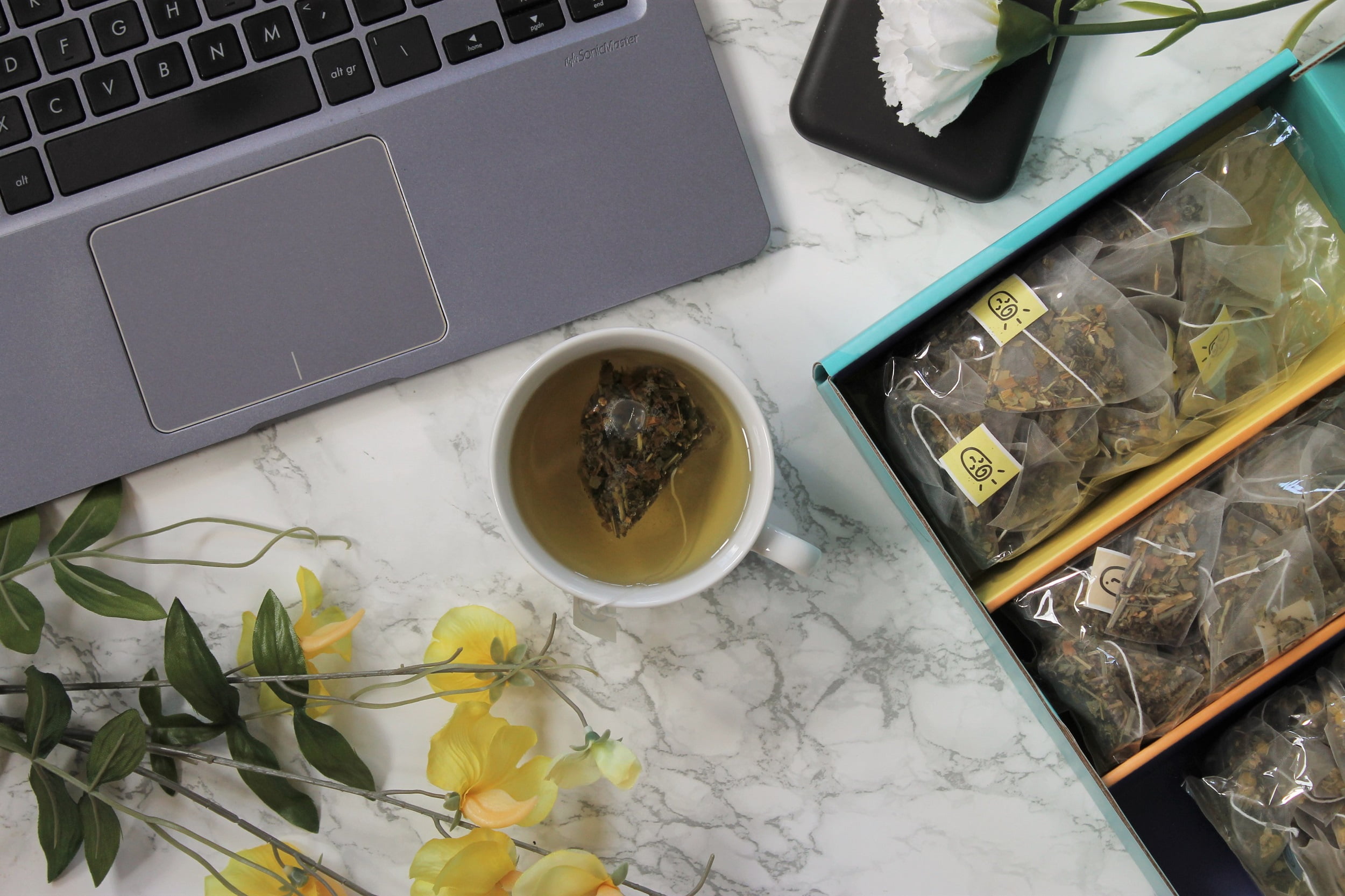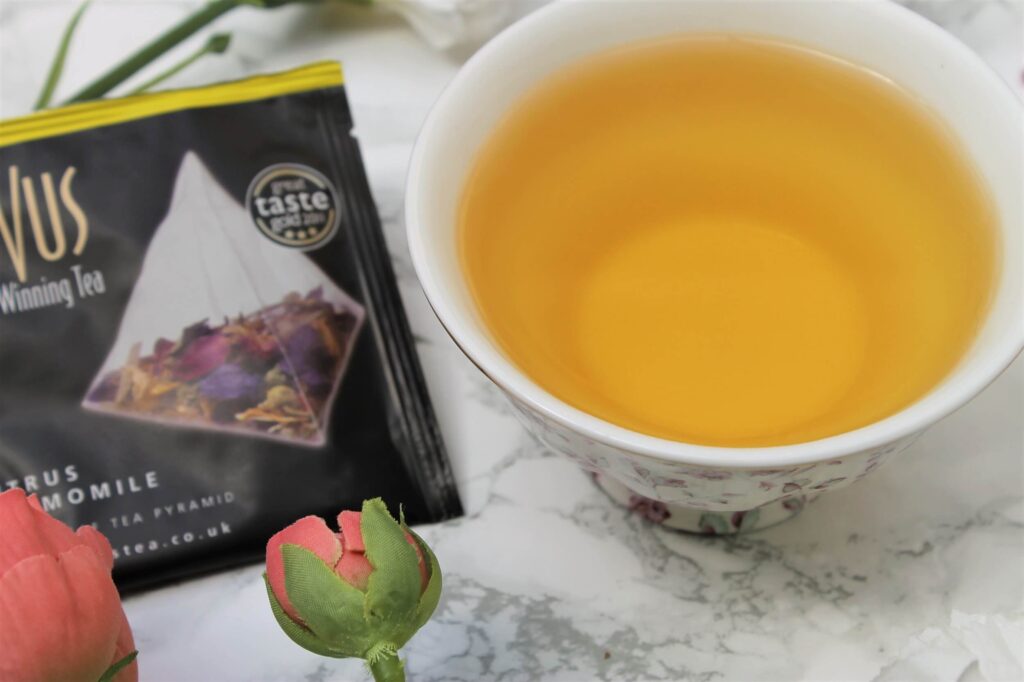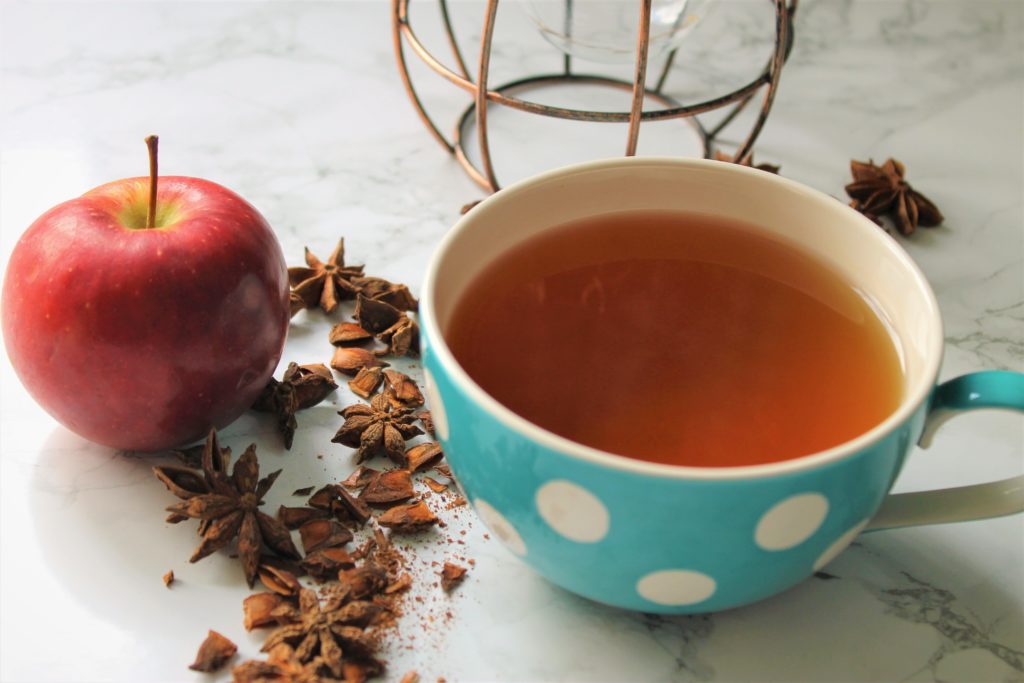
Happy Teas You Need in Your Life

How do you define happiness? It’s a question that not too many people have an answer for. But most of us can agree on one thing – it’s the absence of darkness, whether it’s in the form of sadness, anxiety, depression, or just stagnation. And that’s what happy teas are all about. Eradicating darkness.
In this guide, I’ll explain what happy teas are, what common ingredients are used, and my top 5 recommendations. Oh, and if you’re here looking for tea that gets you high, go back to Google and try another link. That’s just not my vibe.
Defining Happiness
I’ve been looking into teas that are marketed as happy teas. One of the prime examples is Clipper Happy Mondays tea, which blends lemon, ginger and black pepper together to create a warming and fiery blend. It gets you up on your feet and clears away the cobwebs!
But what exactly is it about tea that helps promote happiness? After analysing the teas that my readers and myself have marked as the most positive, joy-inducing blends, I’ve managed to come up with 5 definitions.
- Tea that enhances dopamine (it literally produces happiness)
- Tea that relieves sadness, anxiety, and depression
- Tea that stimulates you
- Tea that mellows you
- Tea that reminds you of happy times
If you are feeling jittery and too energetic, then a mellow tea can bring you back down to that sweet spot. Likewise, a tea that stimulates you can lift you away from stagnation.
I also find that teas that have a nostalgic value also bring about a great sense of happiness. For me, an Earl Grey smells like home and jasmine green tea is the flavour of contentment.
But there are also two types of tea that can literally produce happiness. The first is any tea that can increase dopamine. Green tea and caffeine are two components that are known to boost dopamine, as well as dark chocolate and various dairy elements that you may incorporate into your cuppa.
The second are teas that could reduce anxiety and depression. One of the most well-known is chamomile, as it has sedative properties. Studies have found that it can significantly reduce anxiety symptoms as well.
My Top 5 Happy Teas
Here are 5 teas that I have personally reviewed, split into types of happy teas! Depending on your upbringing, your most nostalgic happy tea will be completely different to mine. Don’t be afraid to play around with teas and find something new – getting a variety of flavours in your life is key to happiness too, I find. You can use my Tea Review Index to get started.
For Extra Dopamine – Naoki Fragrant Yame Matcha

- Ingredients: Matcha green tea powder from Yame, in the Fukuoka Prefecture of Japan
- Flavour: Sweet grass, buttery, popcorn, genmaicha
- Availability: Naoki or Amazon
As I just mentioned above, two of the best ‘foods’ to boost dopamine are green tea and caffeine. The problem here is that most green teas are naturally low in caffeine… with the exception of matcha. This powdered Japanese green tea is whisked into hot water to create a frothy beverage. There’s around 70mg of caffeine in 1 teaspoon of powder.
I’ve chosen Naoki Fragrant Yame Blend because it’s really good for beginners. The flavour is smooth, sweet and a little buttery. You can also make it into a matcha latte with a little sugar, so it’s more palatable. If you have the time, I do highly recommend preparing matcha with a traditional whisk and bowl. This method forces you to slow down and take care when preparing the beverage, which I always find is good for wellness in general. Read the full review of Naoki matcha on the blog or use the links above to purchase it directly.
To Reduce Anxiety and Depression – Novus Citrus Chamomile

- Ingredients: Lemongrass, chamomile flowers, lemon verbena, malva, marigold, rose
- Flavour: Full-flavoured, full-bodied, bright, chamomile hay, lemongrass
- Availability: Novus or Amazon UK
This tea is unusual but ultimately delicious. My official review of this tea gave it a 3.8 rating, which is pretty high for a herbal tea. I’ve chosen it as my happy tea to reduce anxiety and depression thanks to the two main ingredients.
Chamomile flowers are well-known for their anxiety-reducing effects. The mellow and sweet flavour is also really soothing – I know a lot of people may be put off by the idea of drinking a floral tea, but chamomile flowers really don’t have a floral taste, so don’t worry.
The other key ingredient is lemongrass. Although there’s not much scientific evidence, lemongrass is an herbal remedy for depression. Many holistic medicine websites suggest that it soothes your mind, boosts your mood, and increases serotonin levels in your body to reduce depression.
This tea is really bright and has a refreshing citrus edge, which I believe is great for refreshing your day too.
To Stimulate Your Senses – Zest Spicy Masala Chai

- Ingredients: Black tea, cardamom seeds, ginger root, cinnamon chips, cloves, natural flavour, tea extract
- Flavour: Rich, full-bodied black tea with cloves and ginger
- Availability: Zest Tea or Amazon
If you want to liven up your day and push away any dullness, then I suggest Zest Tea’s Spicy Masala Chai. This is one of their energy teas, containing up to 150mg of caffeine per cup. That alone is enough to get your energy levels rocketing! Thanks to the L-Theanine content of tea, it won’t cause a horrific energy crash later on either.
I chose this specific blend from Zest because it’s perfect for cold autumn and winter days. When the weather has you feeling blue, this tea is really warming and rich. I reviewed this tea without milk, but chai is definitely best consumed with a generous amount of milk (I prefer soya milk). You can also add some sugar to taste.
Just be aware that the caffeine in this tea is not something to take lightly – I can only have one Zest Tea in the morning and no other caffeine for the rest of the day if I plan to sleep that night!
To Help You Mellow Out – Offblak Squeeze Me

- Ingredients: Green tea, lemongrass, orange peel, orange flowers, jasmine extract, flavourings
- Flavour: Cleansing, smooth, sweet, juicy orange, floral hints
- Availability: Offblak or Amazon
Jasmine green tea is one of the most relaxing teas ever created – it’s a classic! My readers know that I have some really good memories attached to jasmine green tea too. However, for my mellow happy tea I have to recommend Offblak Squeeze Me. This is a green tea with orange and jasmine flavours.
In my tea review I was sceptical at first, but the juiciness of the orange and the floral orange blossom notes work so well with the fragrant jasmine scent. This tea is really cleansing and mellows me out before I’ve even taken that first sip.
The jasmine is the weakest flavour, so it’s best to think of this as an orange flavoured green tea with hints of jasmine. Nonetheless, it is really soothing and naturally low in caffeine so it’s great for hectic afternoons too.
Izzy’s Most Nostalgic Happy Tea – Whittard Earl Grey

- Ingredients: Black tea, bergamot flavouring
- Flavour: Light black tea with bergamot citrus flavour
- Availability: Whittard or Amazon
I grew up drinking Earl Grey and my first ever blog review was for Twinings Earl Grey. But the tea brand that really brings me joy is Whittard Earl Grey. I love visiting their outlet stores, tasting samples, and discovering something new. Of course, not every new tea is a hit like their classic Earl Grey!
This tea really hits the spot for me and is the happy tea I reach for most regularly. I highly recommend having a box of everyday happy tea in your kitchen. It doesn’t even need to be a high-quality tea – it can just be whatever your parents drank or whatever tea holds the most nostalgia. This really lifts my mood on dark days.
Earl Grey is also really versatile which makes it great as a happy tea. If you’ve run out of milk, it tastes amazing with a slice of lemon instead. You can bake with Earl Grey too. In the summer, I like to ice it with a little honey – delicious! There’s never a bad time for a cup of Earl Grey.
FAQs
High-caffeine green tea, like matcha, supposedly boosts happiness by increasing dopamine. Other teas promote happiness by evoking nostalgic memories. You can also find teas that mellow you out or have a comforting feel, which is also a kind of happiness.
Happy tea is simply tea that makes you feel happy, either by promoting dopamine and serotonin, managing your mood, reducing anxiety, or evoking a memory that makes you feel good.
Herbal teas are best for depression and anxiety, or caffeinated teas that are high in amino acid L-Theanine. Chamomile, lemongrass and spearmint are some of the most widely recommended teas for anxiety and depression.
Tough question! Pukka are dominating the wellness market in terms of supermarket teabags. However, if I had to choose I’d probably go for Offblak or a brand that focuses on adaptogen ingredients like THEENK or Trust Tea.
Lemongrass is an herbal remedy for depression, although there’s not a great deal of scientific evidence supporting it. Many brands are now creating CBD teas, which may help depression too. I urge you to ask your doctor about herbal remedies for depression first – best to be safe.
There’s no one answer to this question. Typically, any ingredient that has a sedative-like effect (chamomile, lavender, valerian) is good for keeping your mood mellow and stable. Many people swear by ayurvedic ingredients too, like ginger, turmeric and tulsi (holy basil).
Yes, traditional tea improves your mood. L-Theanine, a key amino acid that’s found in tea leaves, promotes feelings of calmness while stimulating creativity and focus. That’s why tea has a calmer energy than coffee, even though they both provide caffeine.
For many people, yes. This is due to nostalgic memories and social convention (sharing a pot of tea with friends or family) as well as the dopamine-boosting properties of tea and some herbal infusions.